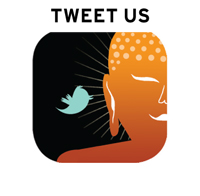A Scarcity of Joy
Thanissaro Bhikkhu’s “Skillful Shelter” (Summer 2013) certainly outlines a very pure path that leads to the elusive state of happiness. Yet except for the most dedicated of practitioners, his three-step method seems a bit exclusionary. One wonders if the oneness of life has been set aside for a kind of isolated contemplation that removes the practitioner from the world at large, or at the very least, modifies the witnessing of life to a carefully constructed minimalist approach. His basic principles, “choosing admirable friends, living frugally, and finding seclusion,” are all qualities to be considered and practiced when appropriate. But when the meditative life must be constructed in too narrow a fashion in order to achieve happiness, there would appear to be a certain attachment to control rather than flowing with things as they are. A scarcity of joy might follow if there were any misinterpretations of Thanissaro Bhikkhu’s methodology.
—Allen Hicks
Ashland, OR
Life’s Trickiness
I feel that following the principles Thanissaro Bhikkhu suggests in “Skillful Shelter” would add more to the bounded and isolating aspects of our society. The process of “choosing admirable friends” that the article puts forward is first and foremost a judgment about other people and reinforces the perception of “me” separate from (and superior to!) “you” or “them.” It also feels like a process of identifying something “wrong” in the world and then trying to push it away, which would be a form of aversion. I personally think that life’s messiness and awkwardness and confrontations are where the good stuff can be reached with mindful attention. Dealing with a difficult person and learning to love them can be a wonderful journey of self- and other-discovery. Finally, I don’t believe that being around difficult people induces their habits and behaviors in us. Aren’t we all difficult? Aren’t we all messy? Isn’t that wonderful in itself, something to be celebrated?
And I say a big NO! to the line “In some cases, if a friendship is centered on unskillful activities, you might consider putting it on hold.” I can imagine how my friends would feel if they knew I was doing that to them: hurt, isolated, their self-esteem depleted, all of which would only add to the difficulty of the situation.
My fundamental belief is that life’s trickiness is its juiciness. Can’t we have a meditation practice that includes everybody, that recognizes that the difficulties we feel come from others are actually difficult feelings arising within ourselves? Can’t we have a practice that opens ever outward rather than closing off others?
Yours,
Difficult Human Being #5,890,987,678
—Robert Szymanek
London, United Kingdom
Wrong is Wrong
In “The Art of Being Wrong” (Spring 2013) Henry Shukman uses the word “wrong” several times in describing an awakening that abruptly changes the course of one’s thinking. This seems backward to me. This perspective suggests that the causes and conditions leading to a person’s awakening are wrong, therefore creating the need for a change to be made. Accordingly, because the thinking is “wrong,” that part of the past should be disregarded. I might humbly remind the author that it is the causes and conditions along our individual paths that lead to the many awakening moments we have. It is only after our experiences occur that we can determine the true nature of our path. If we are burdened with “wrong” before the experience, then we will never discover the limitations of this one experience of life each of us has.
—Anthony Armstrong
Brooklyn, NY
The Author Responds
Thank you for this excellent observation. I guess I was struck by how many of the great Zen masters characterized an awakening experience with an exclamation of their prior wrongness. How wrong I have been! But that’s not to say that they realized they were wrong before such a moment. And so it is for us. So really there needn’t be any burden of wrongness beforehand, just the joy of realization that includes the recognition of prior misconceptions, at the time or in retrospect. But how “right” you are to point out that of course all our prior experiences are indeed the myriad forms of compassion that carry us to awakening. So in that sense they are never wrong at all. Thank you! I was wrong again!
—Henry Shukman
Correction
In my article “Treasury of Lives” (Summer 2013), which traced the incarnation lineage of Jigme Lingpa and Khyentse Wangpo, I wrote that no details are known about Jamyang Chökyi Wangchuk. I have since learned that he was the uncle of Chögyal Namkhai Norbu, a Dzogchen master based in Italy. Namkhai Norbu Rinpoche has published a biography of his uncle, The Lamp That Enlightens Narrow Minds (North Atlantic Books, 2012), detailing the activity of this important master. I regret my omission of this information.
—Alexander Gardner
Associate Director, Shelley & Donald Rubin Foundation

Thank you for subscribing to Tricycle! As a nonprofit, we depend on readers like you to keep Buddhist teachings and practices widely available.
